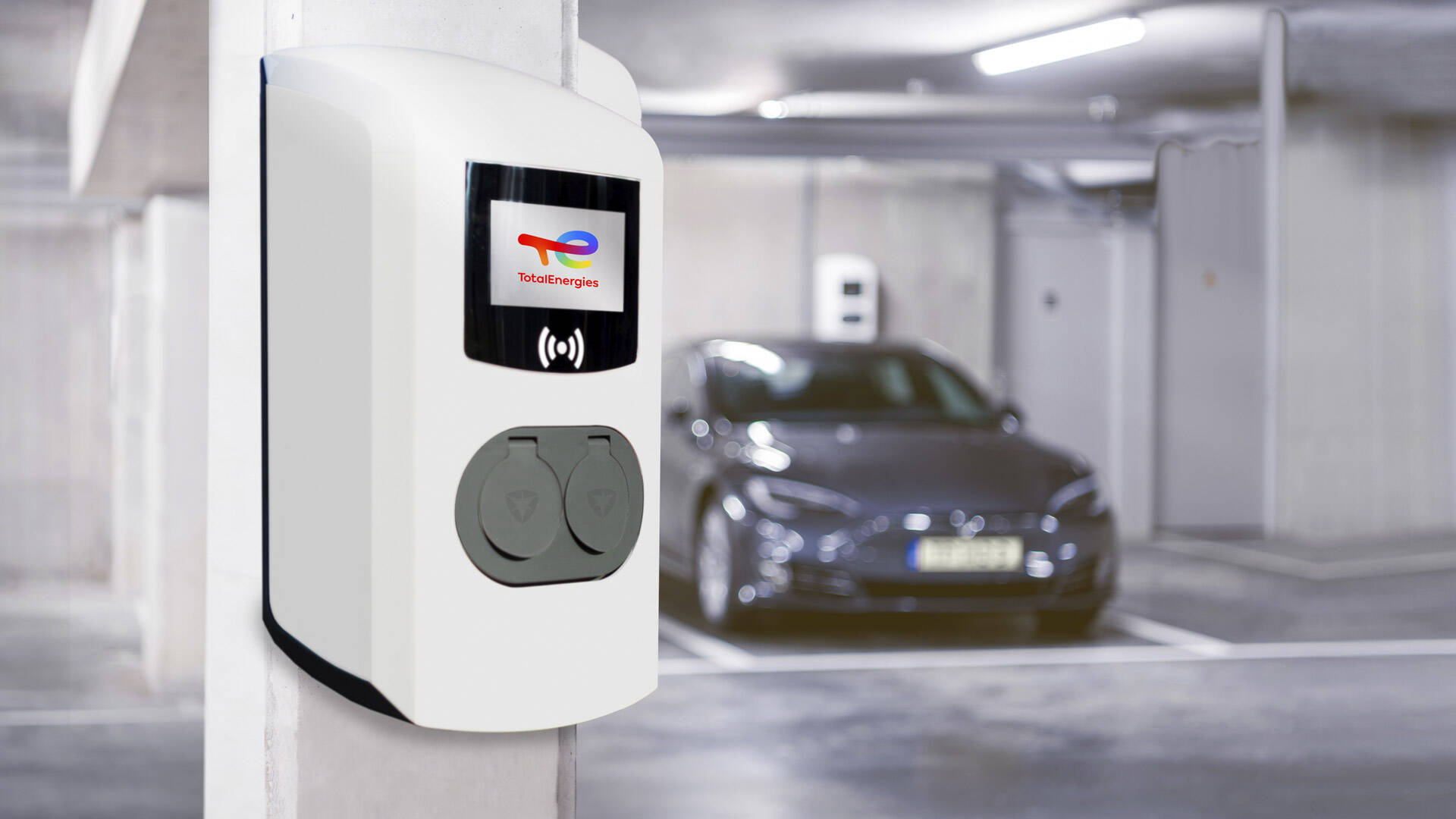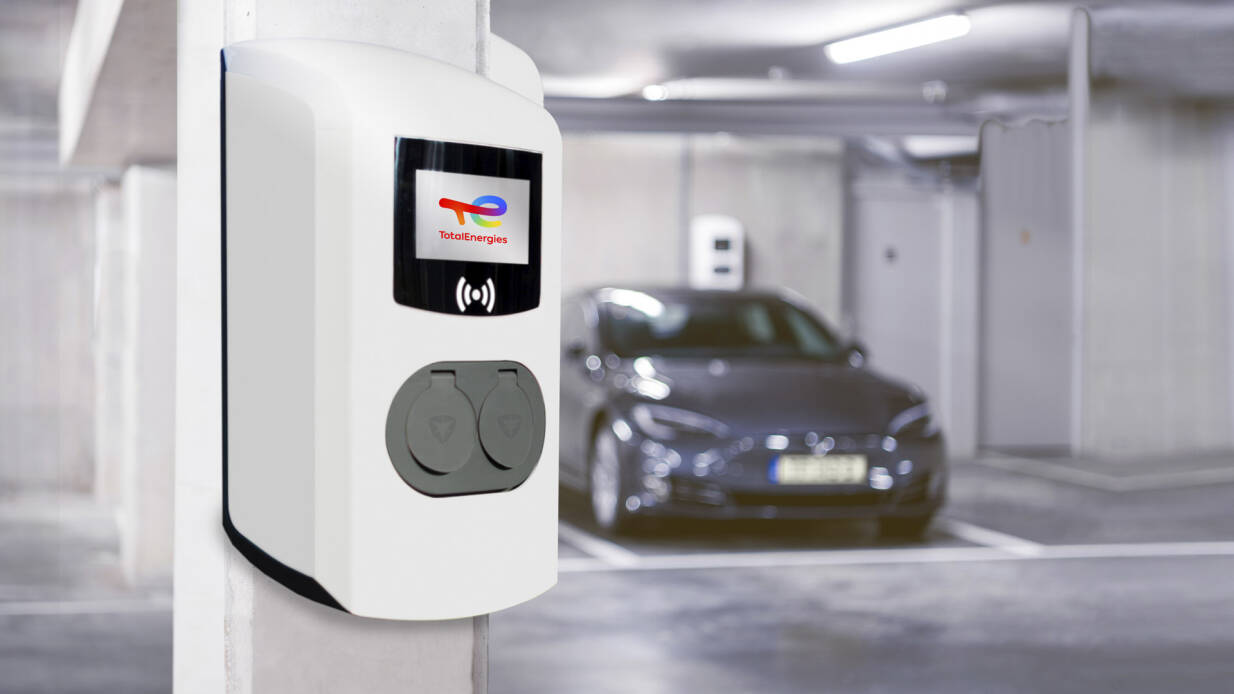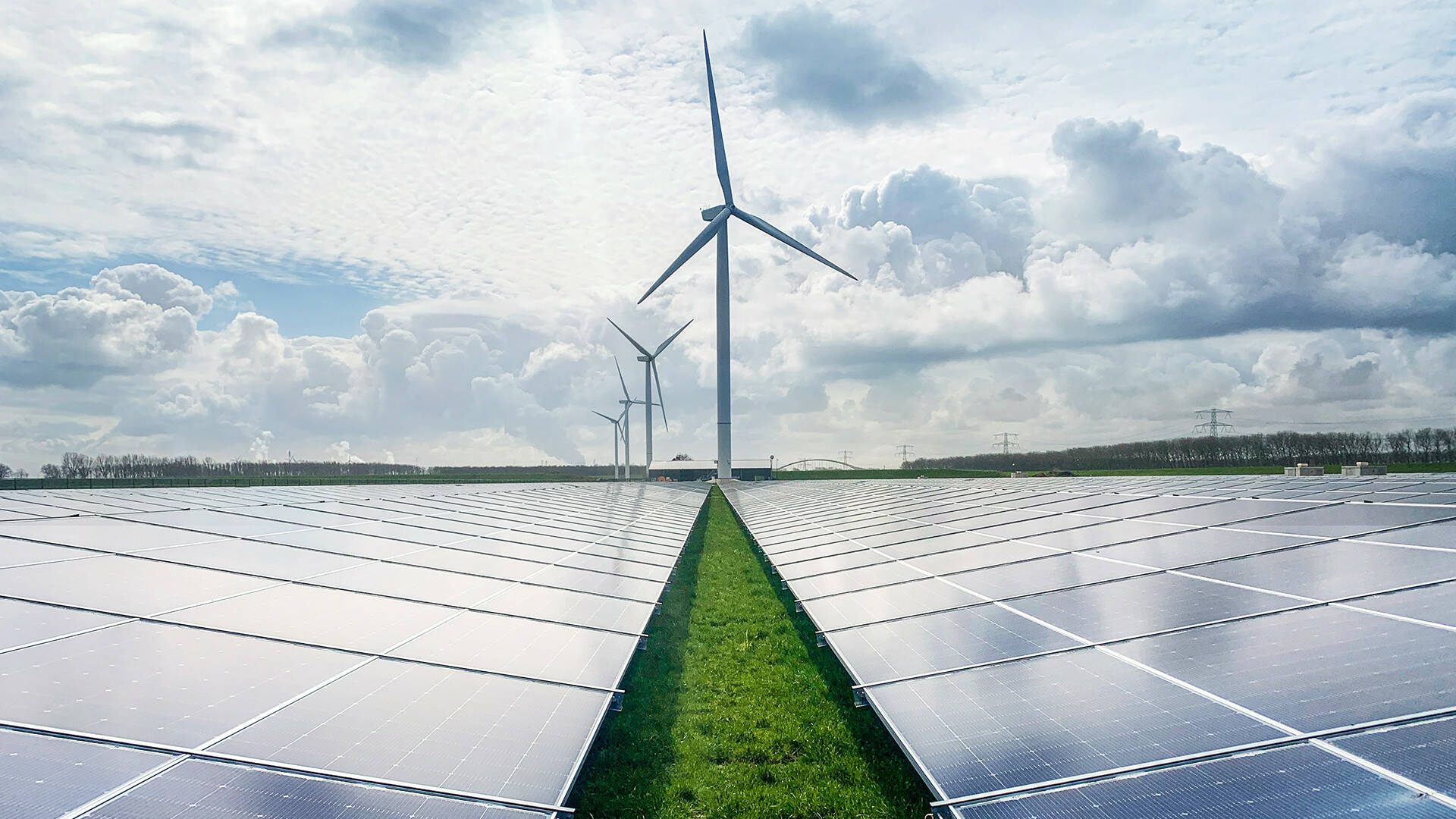
Energy giant,
TotalEnergies,
looks forward to an electric future



Go to next article

Go back
scroll down

difficult to achieve. In an industry which has seen a lot of mergers and acquisitions, we also appreciate that Alfen has remained independent as this is very important for us. The EV world is moving fast and the numbers are huge – tens of millions of electric vehicles are expected in Germany alone by 2030 – and so we are happy that TotalEnergies and Alfen can cooperate and evolve together.
I was delighted to be asked to be part of this magazine because Alfen is an important partner for us in our transformation to broader energies. Alfen is our preferred key supplier. Alfen products deliver a prime standard that is in line with our AC charging requirements. Most importantly, Alfen’s charging stations conform with the German legal requirement for calibration also known as “Eichrecht”, which we know can be
Can you talk about your relationship with Alfen and how it adds value?
In the field of EV charging, we have two areas of focus: To install DC high power chargers in our service station network all over Europe and to provide the B2B and public sector with custom AC charging solutions. By 2023 we aim to have 1,000 charge points at 500 European locations. Initially, we will deploy them at highway locations, for example, we have 100 sites in Germany with 200 high power chargers. For B2B charging solutions, in Germany, we have acquired a company called Charging Solutions and our aim is to achieve 42,000 charge points by 2025. These will predominantly be AC chargers, which are installed for corporate customers and their fleet vehicles but also in public places such as hospitals, shopping malls, etc. In addition to this, the TotalEnergies Charging Solutions department also offers DC chargers to its customer base. This strategic acquisition was very important to us because it saved time by delivering us with existing expertise, processes, customers and employees but, as with any acquisition, we need to make sure that those employees stay happy and motivated through a period of change and develop a culture for them to thrive in a growth sector, where recruiting experienced people is competitive.
We already have a large fleet customer base and most of these are already starting to transform to EV and so there is a good opportunity for us to provide them with charging solutions, both for fleet vehicles at work and at employee homes - and Alfen is a recognised and preferred brand for this solution. Another area of focus is to equip parking lots, for example, at supermarket chains, where we will look at introducing 50kW chargers so people can fuel in the 30min that is takes to do shopping.
We have various business models. Depending on the specific needs of the customers, we invest and operate the fuelling equipment as well as selling the energy and, sometimes, we only do one or two elements of that. For EV charging through, our aim is to increasingly move into the charge point operator’s role. Digitalisation is crucial for achieving this and for energy transition as a whole. It has been an important part of TotalEnergies journey so far and, while transforming our back-office systems is a challenge, we recognise the need to accelerate in order to provide our customers with the optimal offering, operate in a cost-effective and environmentally friendly way, and to allow us to scale up rapidly. As a result, we have some key innovations in the pipeline.
Can you tell us about TotalEnergies EV charging proposition, aims and new business challenges?
As a global company, can you explain more about the specific regional challenges you face?
We intend to lower our direct emissions by improving
our energy efficiency, eliminating routine flaring, electrifying our processes and reducing methane emissions. While decarbonising our own activities is something we can actively address, getting some countries and customers to change the nature of their demand is more difficult. In Europe and the US, we are confident that will get there but other parts of the world are more challenging.
Coal needs to be replaced as quickly as possible by lower carbon energies and we need to work with countries to help them transform and benefit from the opportunities that more, and cleaner, energy production offer. We have recently invested heavily in renewables and natural gas in India which is a coal dominant country. China has also been very coal dominant but renewables growth there is now extremely fast.
We will not consider divesting in countries that won’t adapt quickly enough because it will not solve the issue - someone else will just step in. It’s a joint effort to meet the growing energy needs in all regions in which we are active, while reducing carbon emissions. That is why TotalEnergies is forming partnerships with governments, local partners and consumers, as well as championing policies that advance the cause of carbon neutrality. One of these is carbon pricing because it is a major driver for promoting the least carbon-intensive technologies. We must, of course, ensure that the carbon price trajectory is acceptable to customers, individuals and businesses alike.
“ We firmly believe that the 21st century will be the century of electricity ”
TotalEnergies will invest around €50 billion on the expansion of renewable energies by 2030. Our main focus is renewable energy production and we aim to be one of the top 5 producers by 2030, primarily via onshore and offshore wind and, the next step, which is floating offshore wind. We also want to play a role in e-mobility as part of a drive to replace traditional transportation fuels.
We are also active in carbon capture and storage (CCS) and forestry. We believe CCS is important because some industrial customers will not be fully able to decarbonise their activities and will therefore need to compensate them. We are confident we are getting closer to the economic viability of this technology and are involved in initial pilot projects. There is definitely still a need for further innovation and new technologies, for example, green hydrogen which will likely be accelerated by the EU Emissions Trading System.
TotalEnergies supports the aims of the Paris Agreement so our strategy aims to be consistent with them and we have already been on a transformation journey for several years. Things have really sped up in recent years though which has required us to clearly state our ambition to achieve zero emissions by 2050 in conjunction with society. This is a challenge because a large part of it relies on our customers’ ability to change.What began as an ambition is now very much part of a process. We have a clear roadmap with definitive targets for 2025 2030 and so on.
To anchor such a significant transformation and help people internally and externally to recognise the strength of our intent to become a broader energy company we decided to change our name. We will no longer be an oil and gas company. By 2050 the goal is to be 40% electricity (mainly renewable) 40% hydrogen/biogas and 20% fuels. This whole shift the aims milestones and rebrand received really positive support from our shareholders and so we feel strongly that we are on the right path. There is no doubt that we will have to evolve and adapt further but we are confident we are going in the right direction.
Can you explain more about the underlying strategy and focus areas for your shift to a broader energy company?
Can you introduce yourself and give some background on TotalEnergies?
I joined TotalEnergies as a graduate engineer more than 30 years ago and have held various management positions, almost exclusively in downstream, and have worked in many countries. In October last year, I took over management of TOTAL Deutschland, the German marketing and services branch, which has now become TotalEnergies. I act as the country chair and, amongst other things, have responsibility for external communications and public affairs.
We used to be known as an oil company but have embarked on a journey to transform into a broader energy company and this has accelerated considerably in recent years. Becoming a broader company, integrated at all levels, from production to customers, is important for us. It has been that way with our oil business historically but, while we think that the demand for oil will continue over the next 20 to 30 years, the expansion of renewable energies will be the key to decarbonisation. That is why we have lifted our investment goal for gross renewable power generation capacity to 35 GW by 2025. Obviously, we have also accelerated our shift to electricity because we firmly believe that the 21st century will be the century of electricity.

An interview with Christian Cabrol,
CEO at TotalEnergies Germany
Founded in 1924, as part of France’s drive to develop its own petroleum supply, TotalEnergies is one of the top 10 largest oil and gas companies in the world. Its businesses cover the entire oil and gas chain, from crude oil and natural gas exploration and production to power generation, transportation, refining, petroleum product marketing, and international crude oil and product trading.
More recently, as part of its ambition to reduce its direct emissions to net zero by 2050, TotalEnergies has invested heavily in green technologies including renewables, e-mobility, biogas and biofuels.
It has also recently rebranded from TOTAL to TotalEnergies, to position itself as a broader energy company, and set out some bullish goals, one of which is to become one of the world’s top 5 renewable energy producers.
After a 30-year career at the organisation, Christian Cabrol became CEO of TotalEnergies in Germany in October 2020. We spoke to him about the company’s transformation in response to energy transition and, more specifically, about its
e-mobility activities and the role of digitalisation.


Energy giant,
TotalEnergies,
looks forward to an electric future

I was delighted to be asked to be part of this magazine because Alfen is an important partner for us in our transformation to broader energies. Alfen is our preferred key supplier. Alfen products deliver a prime standard that is in line with our AC charging requirements. Most importantly, Alfen’s charging stations conform with the German legal requirement for calibration also known as “Eichrecht”, which we know can be difficult to achieve. In an industry which has seen a lot of mergers and acquisitions, we also appreciate that Alfen has remained independent as this is very important for us. The EV world is moving fast and the numbers are huge – tens of millions of electric vehicles are expected in Germany alone by 2030 – and so we are happy that TotalEnergies and Alfen can cooperate and evolve together.
Can you talk about your relationship with Alfen and how it adds value?
In the field of EV charging, we have two areas of focus: To install DC high power chargers in our service station network all over Europe and to provide the B2B and public sector with custom AC charging solutions. By 2023 we aim to have 1,000 charge points at 500 European locations. Initially, we will deploy them at highway locations, for example, we have 100 sites in Germany with 200 high power chargers. For B2B charging solutions, in Germany, we have acquired a company called Charging Solutions and our aim is to achieve 42,000 charge points by 2025. These will predominantly be AC chargers, which are installed for corporate customers and their fleet vehicles but also in public places such as hospitals, shopping malls, etc. In addition to this, the TotalEnergies Charging Solutions department also offers DC chargers to its customer base. This strategic acquisition was very important to us because it saved time by delivering us with existing expertise, processes, customers and employees but, as with any acquisition, we need to make sure that those employees stay happy and motivated through a period of change and develop a culture for them to thrive in a growth sector, where recruiting experienced people is competitive.
We already have a large fleet customer base and most of these are already starting to transform to EV and so there is a good opportunity for us to provide them with charging solutions, both for fleet vehicles at work and at employee homes - and Alfen is a recognised and preferred brand for this solution. Another area of focus is to equip parking lots, for example, at supermarket chains, where we will look at introducing 50kW chargers so people can fuel in the 30min that is takes to do shopping.
We have various business models. Depending on the specific needs of the customers, we invest and operate the fuelling equipment as well as selling the energy and, sometimes, we only do one or two elements of that. For EV charging through, our aim is to increasingly move into the charge point operator’s role. Digitalisation is crucial for achieving this and for energy transition as a whole. It has been an important part of TotalEnergies journey so far and, while transforming our back-office systems is a challenge, we recognise the need to accelerate in order to provide our customers with the optimal offering, operate in a cost-effective and environmentally friendly way, and to allow us to scale up rapidly. As a result, we have some key innovations in the pipeline.
Can you tell us about TotalEnergies EV charging proposition, aims and new business challenges?


Go to next article

Go back
As a global company, can you explain more about the specific regional challenges you face?
We intend to lower our direct emissions by improving our energy efficiency, eliminating routine flaring, electrifying our processes and reducing methane emissions. While decarbonising our own activities is something we can actively address, getting some countries and customers to change the nature of their demand is more difficult. In Europe and the US, we are confident that will get there but other parts of the world are more challenging.
Coal needs to be replaced as quickly as possible by lower carbon energies and we need to work with countries to help them transform and benefit from the opportunities that more, and cleaner, energy production offer. We have recently invested heavily in renewables and natural gas in India which is a coal dominant country. China has also been very coal dominant but renewables growth there is now extremely fast.
We will not consider divesting in countries that won’t adapt quickly enough because it will not solve the issue - someone else will just step in. It’s a joint effort to meet the growing energy needs in all regions in which we are active, while reducing carbon emissions. That is why TotalEnergies is forming partnerships with governments, local partners and consumers, as well as championing policies that advance the cause of carbon neutrality. One of these is carbon pricing because it is a major driver for promoting the least carbon-intensive technologies. We must, of course, ensure that the carbon price trajectory is acceptable to customers, individuals and businesses alike.

Can you explain more about the underlying strategy and focus areas for your shift to a broader energy company?
TotalEnergies supports the aims of the Paris Agreement so our strategy aims to be consistent with them and we have already been on a transformation journey for several years. Things have really sped up in recent years though which has required us to clearly state our ambition to achieve zero emissions by 2050 in conjunction with society. This is a challenge because a large part of it relies on our customers’ ability to change.What began as an ambition is now very much part of a process. We have a clear roadmap with definitive targets for 2025 2030 and so on.
To anchor such a significant transformation and help people internally and externally to recognise the strength of our intent to become a broader energy company we decided to change our name. We will no longer be an oil and gas company. By 2050 the goal is to be 40% electricity (mainly renewable) 40% hydrogen/biogas and 20% fuels. This whole shift the aims milestones and rebrand received really positive support from our shareholders and so we feel strongly that we are on the right path. There is no doubt that we will have to evolve and adapt further but we are confident we are going in the right direction.
TotalEnergies will invest around €50 billion on the expansion of renewable energies by 2030. Our main focus is renewable energy production and we aim to be one of the top 5 producers by 2030, primarily via onshore and offshore wind and, the next step, which is floating offshore wind. We also want to play a role in e-mobility as part of a drive to replace traditional transportation fuels.
We are also active in carbon capture and storage (CCS) and forestry. We believe CCS is important because some industrial customers will not be fully able to decarbonise their activities and will therefore need to compensate them. We are confident we are getting closer to the economic viability of this technology and are involved in initial pilot projects. There is definitely still a need for further innovation and new technologies, for example, green hydrogen which will likely be accelerated by the EU Emissions Trading System.
“ We firmly believe that the 21st century will be the century of electricity ”
Can you introduce yourself and give some background on TotalEnergies?
I joined TotalEnergies as a graduate engineer more than 30 years ago and have held various management positions, almost exclusively in downstream, and have worked in many countries. In October last year, I took over management of TOTAL Deutschland, the German marketing and services branch, which has now become TotalEnergies. I act as the country chair and, amongst other things, have responsibility for external communications and public affairs.
We used to be known as an oil company but have embarked on a journey to transform into a broader energy company and this has accelerated considerably in recent years. Becoming a broader company, integrated at all levels, from production to customers, is important for us. It has been that way with our oil business historically but, while we think that the demand for oil will continue over the next 20 to 30 years, the expansion of renewable energies will be the key to decarbonisation. That is why we have lifted our investment goal for gross renewable power generation capacity to 35 GW by 2025. Obviously, we have also accelerated our shift to electricity because we firmly believe that the 21st century will be the century of electricity.

An interview with Christian Cabrol,
CEO at TotalEnergies Germany
Founded in 1924, as part of France’s drive to develop its own petroleum supply, TotalEnergies is one of the top 10 largest oil and gas companies in the world. Its businesses cover the entire oil and gas chain, from crude oil and natural gas exploration and production to power generation, transportation, refining, petroleum product marketing, and international crude oil and product trading.
More recently, as part of its ambition to reduce its direct emissions to net zero by 2050, TotalEnergies has invested heavily in green technologies including renewables, e-mobility, biogas and biofuels.
It has also recently rebranded from TOTAL to TotalEnergies, to position itself as a broader energy company, and set out some bullish goals, one of which is to become one of the world’s top 5 renewable energy producers.
After a 30-year career at the organisation, Christian Cabrol became CEO of TotalEnergies in Germany in October 2020. We spoke to him about the company’s transformation in response to energy transition and, more specifically, about its e-mobility activities and the role of digitalisation.






